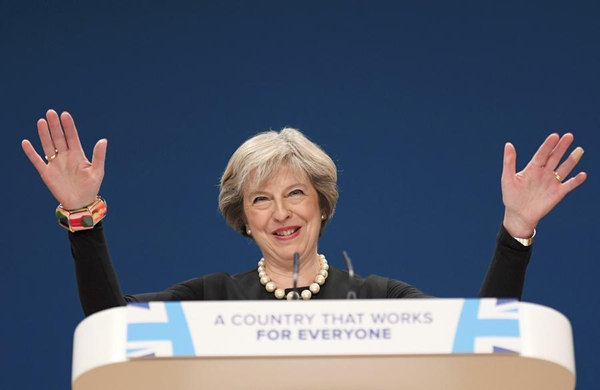May calls election that is hers to lose
 |
|
Britain's Prime Minister Theresa May speaks at the annual Conservative Party Conference in Birmingham, Britain, October 2, 2016. [Photo/Agencies] |
The announcement by British Prime Minister Theresa May on April 18 that she would, subject to a parliamentary vote, be calling an early general election to be held on June 8, has shocked the country's political establishment, and prompted new questions over the country's future outside the European Union.
Brexit is May's official reason for reversing her earlier pledge not to hold an early election. The prime minister hopes to increase the number of Conservative members of parliament (MPs), and thus claim a fresh mandate for taking Britain out of the EU. A Conservative win would likely silence the numerous voices in Britain who currently argue that while the prime minister may have a mandate to trigger the process of leaving the EU thanks to last year's referendum result, she does not have a mandate to take the country out of both the EU and the bloc's single market –– the so-called "hard brexit".
"The country is coming together but Westminster is not," she claimed, in a dig at members of both Houses of Parliament who remain opposed to brexit.
The leaders of Britain's opposition political parties quickly hit the airwaves to claim they were ready for an election.
But they are not, and Theresa May knows it. In fact, the main opposition parties –– the Labour Party and Liberal Democrats –– are woefully unprepared to take on the Conservatives.
While British politicians usually claim they pay no attention to opinion polls, it's highly unlikely the prime minister is not motivated by recent polls which put her party 18 to 20 points ahead of the struggling Labour Party. The abysmal ratings of Labour's leader, Jeremy Corbyn, the divided state of his party, along with the shrunken Liberal Democrats, have made the temptation to try and cash in on the apparent opportunity too much to ignore. May faces limited and disorganized opposition and she intends to take full advantage.
May will go to the country seeking a fresh mandate to deliver brexit, and her intentions –– to take the country out of the EU and the single market –– will be clear and easy to present to voters. For people who voted to remain in the EU, the election presents a new opportunity to debate the terms of brexit and oppose the "hard brexit" the Conservative Party intends to deliver.
Yet voters looking to block brexit will struggle to find an effective party to support.
Unless large numbers of Conservative remain supporters desert the prime minister over her brexit policy, voters opposed to the Conservatives will have to unite behind a single party to keep May out of Downing Street. This is unlikely.
At present, the Liberal Democrats seem the best placed to offer a coherent alternative to the form of brexit May is offering. They have recently won a by-election and claim to have signed up thousands of new members since the June 24 referendum last year. Their leader, Tim Farron, is committed to keeping Britain in the single market. Yet they are tainted by their time working with the Conservative Party during the 2010-2015 coalition government, and currently hold just nine parliamentary seats compared to the Conservative's 330.
Yet it's the Labour Party that seems certain to be the big loser of this election. Indeed, the lukewarm campaigning for the remain side during the referendum by the party leader has been singled out as a big contributory factor to the result. Corbyn, who is party leader thanks to the support of party members and its affiliated trade unions, but –– crucially –– not the party's MPs, will almost certainly face the end of his political career on June 9. And while many Labour MPs may be delighted to see Corbyn gone, the party will likely be reduced to a shadow of its former self.
The one unlikely but vaguely plausible scenario that must surely concern the prime minister is that Labour and the Liberal Democrats both do better than expected resulting in a hung parliament –– no party wins enough votes to form a government. Out of this political mess, there might be the potential for some kind of pro-EU coalition to be cobbled together, perhaps with the Scottish National Party.
However, Theresa May is set to fight an election against the weakest opposition since the 1980s. She will almost certainly win, although she should take nothing for granted. Certainties are being turned on their head all around the world, and polling is currently suffering a distinct lack of credibility.But when voters look at the choices on offer, they will see a party with a clear vision for a post-EU future, set against a Labour leader who cannot even command the support of his own MPs, and a number of smaller pro-EU parties.
This prime minister is lucky, and the June election is hers to lose.
James Skinner is a contributing editor at China Daily with an MA in International Relations. He has a particular interest in British and American politics, as well as global security issues.
- Overprotection may cause anti-mainland sentiment
- British PM May calls for early election to strengthen Brexit hand
- British PM May calls for early election to strengthen Brexit hand
- Free movement could continue during Brexit implementation
- Looking on the bright side of Brexit
- UK government criticized for Brexit draft

























